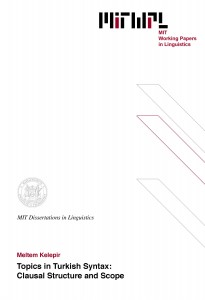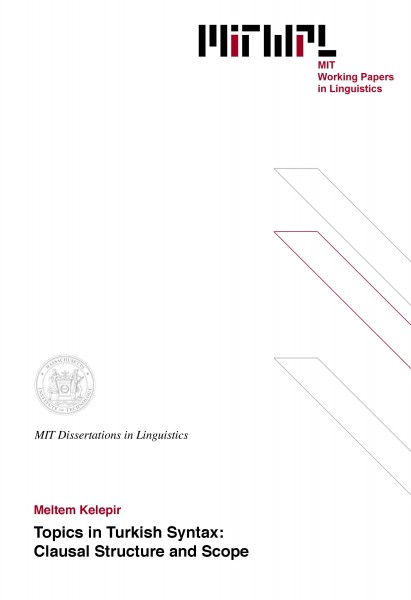Topics in Turkish Syntax: Clausal Structure and Scope
M. Kelepir, 2001
ABSTRACT
This disseration asks two main questions for Turkish: (i) what is the interaction between verbal morphology and the structure?, and (ii) what is the interaction between word order and interpretation? Following Kornfilt (1996) I argue that there are two verbal forms in finite structuresone consists of a participle and a copula, which is inflected for tense and agreement, and the other is a fully inflected verbal form. I propose that the former is formed by a derivation in which the verb moves as far as a functional head such Aspect or Modal, creating a participle. A verbal feature (copula) is inserted at To satisfying its verbal requirement. In the latter case the verb moves all the way up to To. No copula is inserted. The rest of the dissertation focuses on the interaction between structure and quantificational elements. One question addressed is why indefinites marked overtly for accusative case violate scope rigidity, and are interpreted as having wide scope over quantificational elements c-commanding them. It is argued that they do not violate scope rigidity, but rather the unexpected wide scope interpretation is the result of a special interpretative mechanism. Accusative-marked indefinites are interpreted as choice functions. Structures with various quantifiers, indefinites and negative polarity items are discussed, and it is argued that the interpretation of both choice function variables and negative polarity items are subject to intervention effects. Finally, structures with clausal possessives are analyzed. The discussion focuses on one type of clausal possessive in which the possessor is in the genitive case and the possessee agrees with the possessor. It is shown that this construction is subject to a constraint similar to the there-sentences in English in that the possessee cannot be presuppositional. It is argued that the possessor is generated in a constituent within VP with the possessee, but raises to the [Spec, TP]. The possessee remains within VP, and is interpreted non-presuppositionally.
Thesis Supervisors: Irene Heim, Sabine Iatridou, Shigeru Miyagawa, David Pesetsky

